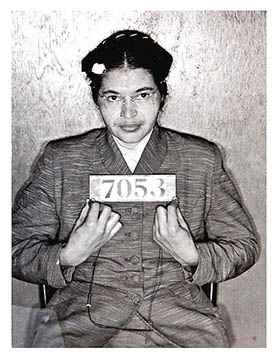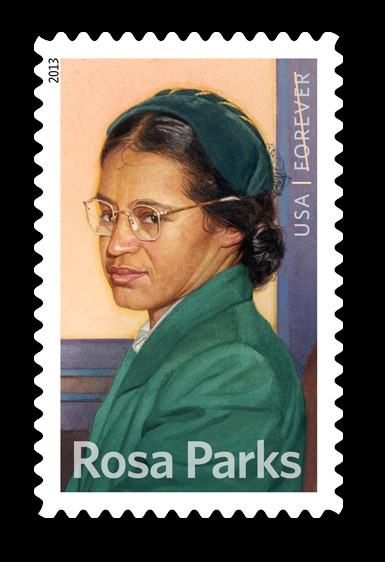Most of us will live our entire lives without ever doing anything significant enough for the entire nation to pay attention to. Fewer still will be remembered by generations for decades to come. Only a handful will be so revered they have schools named after them, and a postage stamp in their honor.
One of those who has become such an icon is Rosa Parks, whose simple but profound act of civil disobedience in December 1955 in Montgomery, Alabama lit a fire under the civil rights movement and helped propel a young preacher named King to his national prominence.
And even though I only got to speak with her on the phone in early 1992, I was nervous and excited…
The day Rosa Parks refused to give up her seat on the bus to a white woman would change American history in a way no one could have foreseen.
But today Rosa Parks is, for many, a distant figure in American history. But that day in 1992 she took time to speak with me about a new book she’d just written, for young people, to remind them that the history wasn’t all that distant after all.
“I had no idea that I was starting anything at all, other than to just let the people who had legally enforced racial segregation, to let them know that I was not pleased with that, as a person, and we as a people are not pleased with it. Plus it had the burden of humiliation and oppression…”

In the way that we often compartmentalize people, some people seemed to think her life began with the bus boycott.
“Some people seem to have that idea. So much of my activity .. none of my activity in my early life has been publicized.”
BT: You really led .. for many, many years you have been at the forefront of the fight for civil rights, the fight for equal rights.
“Yes…”
BT: Have you accomplished the things you had set out to accomplish?
“Some things have been accomplished, but as long as we have any kind of discrimination, I feel that all has not been accomplished and we have much more to do.”
The Montgomery bus boycott inspired by Rosa Parks’ arrest helped propel the Rev. Dr. Martin Luther King Jr. into the leadership role that quickly transformed him into a national figure, fighting for civil rights.
BT: Do you remember the first time you met Martin Luther King Jr?
“Yes, I do. It was in August of 1955, shortly after he had come into Montgomery to be pastor of the Dexter Avenue Baptist Church, and one of his deacons, who was an official of the Montgomery branch of the NAACP invited him to come to the meetings.
“He was very youthful, and I was surprised that such a young person was pastor of that church, a very prestigious church in Montgomery. He was quite friendly and he was very eloquent when he spoke a few minutes to us about conditions that concerned him and should concern all of us…”
BT: Over the years, what has been your biggest challenge?
“I’ve had many challenges. Trying to help other people who were in trouble and having problems that were just insurmountable, especially trying to work in the system such as we had in Montgomery, where the courts were so unfair.
“I can think of the Scottsburg case of Alabama, and there are many individual cases that were not publicized that I’ve worked on, when I was a secretary for the NAACP.”
Of course, one of the biggest challenges when interviewing a figure as prominent as a Rosa Parks is, what do you ask her that she hasn’t been asked a million times before?

So I asked her if there was one question she’s been asked a million times before:
“I think the question is, why did I do what I did on that particular day and just that day? Many people seem to think it was something that was not my usual way of conducting myself.
“However, that day was different from any other day. What made it very significant was after people learned I had been arrested, they unified themselves and made that incident a one-day, spontaneous protest on December 5th. And then, of course, following that success it went on into a protest that lasted more than a year, 381 days, to be exact.”
BT: I guess the time must have just been right,the circumstances must have just been right, for for everything to come together,…
“I think that must have been.”
Rosa Parks died in 2005, at age 92. On her birthday in 2013, the U.S. Postal Service unveiled a postage stamp honoring her.